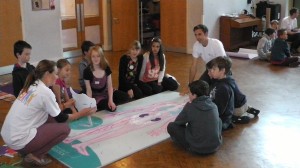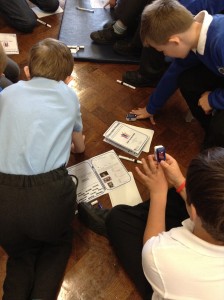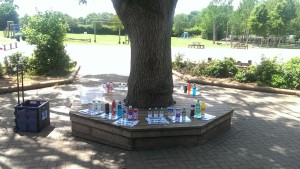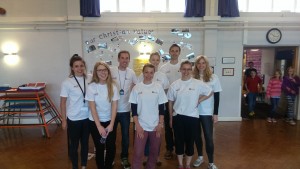 Mark Edwards, Active7 Trial Manager in the School for Policy Studies, reflects on the first term of delivering the FAB Kids outreach workshop in schools. Mark previously blogged on this project here
Mark Edwards, Active7 Trial Manager in the School for Policy Studies, reflects on the first term of delivering the FAB Kids outreach workshop in schools. Mark previously blogged on this project here
It’s been a busy term. Aside from their full-time jobs, Exercise, Nutrition and Health Sciences (ENHS) staff and students have worked hard to get the FAB (Food, Activity, and Bodies) Kids project up and running in schools. Taking the workshop from drawing board to school hall has been an arduous task, but seeing the children (and teachers) learn from and enjoy the workshop activities makes the efforts worthwhile. It has been a rewarding process for FAB staff; going into schools and being in dialogue with small groups of children, learning from them and hearing their stories (sometimes fascinating, other times bizarre), and quickly(!) getting to grips with controlling groups of over-excited children.
Between May and early July, 13 staff and student volunteers have delivered the FAB workshop to 355 children. Workshops have been delivered in 8 mainstream primaries, one Special Educational Needs school, and one fee paying school. We’ve also taken FAB to the Big Bang (Cirencester) and Bridgwater Science Festivals.
What has been the impact?

So what have the children learnt? At the end of each workshop we ask them just this question. As you’d expect (or hope) from a health-focused workshop, lots of children came away with the message that they should ‘always keep healthy and fit and drink what’s right for you’. Many took away messages they can use in their day-to-day lives, such as ‘some drinks that appear to be healthy have a lot of added sugar’ and the ‘more you exercise the less likely you are going to have heart problems’. Others memorised interesting snippets such as ‘Diet Coke contains an ingredient that is in fireworks’, ‘there are over 600 muscles in your body’ and ‘the average heart rate for children is 70-100 beats per minute’. One child was simply speechless (or ironic beyond his years); ‘Absolutely epic! I can’t get any of it out of my head because I learnt so much!’ Whilst most were more conservative in their comments, we hope and think that all children have taken something – however little – from the workshop that may help them to improve their lifestyle.
What did the teachers think?
School staff provide more formal evaluation of the workshop. The three individual workshop activities and the workshop overall (separate questions) were rated ‘very good’ by all teachers. It was interesting to see how teachers engaged with the workshop, with some using it as a way to develop their own knowledge, and experimenting with props and asking questions as if they themselves were participants. The qualitative feedback they provided is testament to the enthusiasm of the staff delivering the workshop. Comments from teachers include:
‘A perfect morning’s learning where the children enjoyed themselves! They loved learning the new facts. All brilliant, staff energetic and formed great relationships with children.’
‘All interactivity was brilliant! Children really enjoy learning in a different way with various approaches.’
‘All the activities were interactive, stimulating and fun for the children. They were enthusiastic and engaged throughout and certainly enjoyed what they were doing.’

‘Really loved the jigsaw/children very engaged. Children liked the booklets and enjoyed all the activities.’
‘All members of the team had a lovely manner with children and quickly established a positive rapport. Not always easy! The resources were all well organised, interesting and engaging.’
Where next?
Although we are delighted with this term’s progress, we are not complacent and have identified several areas for improvement (which will be made over the summer). In September, MSc students will be invited to assist with the delivery of the workshop. As such, we will be designing training sessions and delivery manuals over the next few months. The plan is to allow trained MSc students to deliver the workshop, giving some supervisory roles, and gradually reducing the hands-on involvement of ENHS staff. In September we will begin to book in more schools to receive the workshop.

If you would like any further information on the FAB Kids workshop please visit www.fab-kids.org or email fab-kids@bristol.ac.uk.
FAB team members: Bethan Baker Williams, Rachael Pound (MSc student), Mark Edwards, Laura Pool, Kate Banfield, Byron Tibbitts, Jo Kesten and Sarah Harding.
ENHS is a research centre in the School for Policy Studies. Staff work on a variety of projects focusing on physical activity and nutrition, and their associations with health across the life course. Much research in ENHS is conducted with children in local schools.

